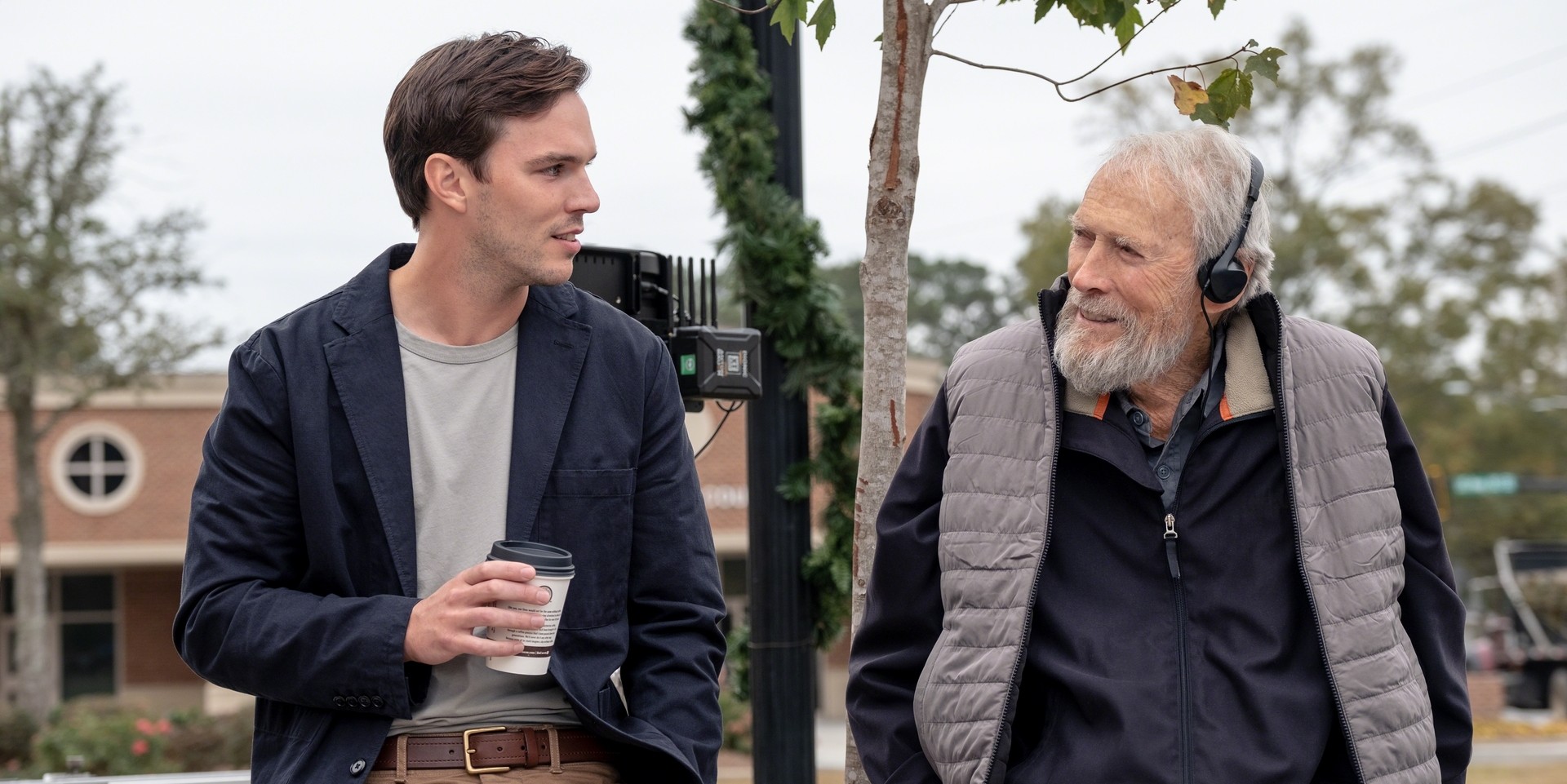
Clint Eastwood is an unstoppable force. An actor and a director who has been building his career since his first appearance on screen in 1955, Eastwood, now 94 years old, has directed and produced a new film. Juror #2 was released in November, and like many of Eastwood’s films, it deals with justice and moral dilemmas that characters face. In the final analysis, it is a moving film that captures the complexity of human life while pointing to the redemptive power of truth.
The film tells the story of Justin Kemp (Nicholas Hoult), a young man in Savannah, Georgia who has been chosen to serve on the jury in the case of a man accused of murdering his girlfriend. Justin is married and his wife, Allison (Zoey Deutsch), is almost ready to give birth. It is a high-risk pregnancy, as we find out that Justin and Allison already lost a baby before. Being called for jury duty is not exactly on anyone’s list of fun activities, and Justin is no different than anyone else in this regard. He tries to get out of jury duty citing his wife’s high-risk pregnancy but the judge rejects his plea.
The prosecutor for the case, Faith Killebrew (Toni Collette) is a fierce woman. She is famous for winning, and as the trial is about to begin, she is running for office of District Attorney, using the case and trial as a way to boost her career and possibly win the election. She is certain that the accused, James Scythe (Gabriel Basso), is guilty beyond a doubt while the defense attorney, Eric Resnick (Chris Messina) insists that there is no solid evidence to tie James Scythe to the murder of his girlfriend, Kendall Carter (Francesca Eastwood).
Kendall was found in a ditch, pushed off the road, and badly beaten by some unidentified blunt object (the murder weapon was never found). Before that, she and Scythe argued heavily in a bar after which Kendall left and was apparently followed by Scythe. It was heavily pouring rain, and the visibility was poor.
We later learn that at the same time, our protagonist, Justin, was in the same bar, visibly distressed. He ordered a drink but never drank it. As he was driving through the rain, he quickly glanced at his phone and hit something. He got out of the car, as any person would, looked around, and couldn’t see anything. It was pitch black. His car was a bit beat up. He assumed that he hit a deer and drove home. But as Faith Killebrew and Eric Resnick make their cases to the jury, it quickly becomes obvious that James Scythe is an innocent man. Thus commences a moral dilemma that fully overtakes Justin’s life. Should he come forward and admit guilt? Or should he be happy he wasn’t caught and move on with his life? This isn’t just about the trial case anymore but about a deeply personal decision to do what is right.
At first, there is a semblance of goodness in Justin. He is a man who is trying to be better. An alcoholic, who is now sober, and regularly goes to AA meetings, he feels that he is on a journey of human perfecting, as much as this is humanly possible. He goes to see his sponsor, Larry Lasker (Kiefer Sutherland), who happens to be an attorney, and explains his situation. Larry gives it to him straight—the fact that Justin is a recovering alcoholic with several DUIs, no jury in this world would believe him that he was sober when he hit Kendall. He would be found guilty and sentenced to prison for the rest of his life.
As the film unfolds, we witness discussions of the jury members. Everyone wants to be done, find Scythe guilty, and go about their lives. Justin is ravaged by guilt and plants the first seed of doubt by asking fellow jury members to at least go over the case material before making a decision. Protests ensue but ultimately they acquiesce. As the evidence is discussed, Justin begins to show that anything could have happened, and what they know thus far does not necessarily mean that Scythe killed Kendall. One of the jurors is irritated and dismissive—if they keep discussing this, they will come up with hundreds of probabilities of what could have happened.
Eastwood never sacrifices the story on the altar of ideology and pseudo-art. In this manner, he belongs to a great tradition of American directors and storytellers.
As the story progresses, Justin’s character grows weaker. He badly wants to live a normal life again, and this keeps overruling the decision to come forward and admit guilt. He is willing to send an innocent man to jail, as is the rest of the jury. They don’t care that there isn’t enough evidence to truly convict Scythe because they, selfishly, want to get back to their lives. This isn’t exactly how model citizens should conduct themselves in such a case, and the fact that one man’s life is in the hands of twelve people who don’t take their duty seriously is frightening, to say the least.
Eastwood has created an atmosphere of tension that extends beyond the courtroom. We become privy to Justin’s interior life and struggle. We become the jury too—should we be compassionate or is justice the only thing that matters, regardless of one man’s condition, and in Justin’s case, being at the wrong time and wrong place? The entire event was senseless, almost supremely stupid, a bad cosmic joke. Yet, justice still must be served.
In one of the scenes, Justin’s sponsor says to him, “We’re only as sick as our secrets.” It is part of the AA 12 Step program to “come clean,” in more ways than one. One of the hallmarks of any alcoholic is lying—to others and especially to ourselves. It is precisely this denial of reality and acceptance of a lie as a way of life that prevents an alcoholic from becoming a better human being. Justin is caught in that dilemma, and his past life of active drinking is running parallel to the car accident.
Eastwood is pointing to a two-fold sense of reality. On one hand, we have the absurdity of existence. The fact that Justin is trying to live a good life and ends up in a place that runs contrary to that exemplifies the strangeness of life. Is it destiny? An accident? A bad choice? Kendall too made a bad and impetuous choice by walking in such conditions. But the event has happened. It cannot be undone. On the other hand, Eastwood tells us that no matter how strange or absurd life is, we are not mere distant observers. We have moral responsibilities. The audience might question whether Justin’s responsibility is toward his family or the innocent man accused of murder and sentenced to life in prison. And yet, there is still a clear delineation between innocence and guilt.
Eastwood has always been known for his authenticity, especially as a director. He has a talent for taking deeply human stories and their inherent domesticity and ordinariness into the realm of extraordinary, almost Homeric drama. Juror #2 is no exception. There is a sense of embodied reality of everyday existence—the way people talk, dress, and act according to the station of their lives. Often, characters in films are presented as caricatures of Americana, especially Southerners. But this is not the case with Eastwood’s choices. Every character has a sense of interiority, even those who appear on the screen very briefly. Even the Southern accents are real, and not some insulting stereotype that inevitably makes a Southerner into a racist idiot redneck.
Toni Collette in particular shows incredible restraint and intensity as the prosecutor, riddled with her own moral dilemma as she realizes that she has been prosecuting an innocent man. Justin Kemp may be “nice” but he proves to be weak and begins to believe his own colorful statements that justice doesn’t necessarily have to equal truth. James Scythe is not simply a man who didn’t commit murder. He is a petty criminal who clearly has a romantic relationship stained by regular verbal and physical violence. In other words, there is nothing “innocent” per se about Scythe. Yet, a character that is so marred by immorality is not guilty of murder.
Eastwood never sacrifices the story on the altar of ideology and pseudo-art. In this manner, he belongs to a great tradition of American directors and storytellers. He is genuinely interested in the American existential and literal landscape, and his films are grounded in time and place, and don’t simply hover in a world that lacks cultural context. Even the brief relations between the jurors reveal certain tensions among different classes and races but Eastwood never hits the audience with a two-by-four over the head. These tensions are subtle, quietly rumbling in the moss-covered gardens of Savannah.
American film director and master storyteller, John Ford (1894–1973) didn’t like to talk about his movies, or about filmmaking in general, but there were a few times when he offered his wisdom. “I like,” he said, “as a director and a spectator, simple, direct, frank films. Nothing disgusts me more than snobbism, mannerism, technical gratuity, and most of all, intellectualism.”
The story is the thing that captures audiences’ consciousness, and this is also Eastwood’s mark on American cinema. With Juror #2, he has given the audience a human story, free of any ideological cacophony that incessantly knocks at our existential doors. Instead, we are invited to enter the story of ordinary people being called to recognize the true meaning of justice in action. The end of the film is particularly powerful and moving. As Justin and his family are enjoying their time together, there is a knock on the door. It is Faith Killebrew. She doesn’t say a word, and she doesn’t have to. Justin knows that justice must be served, and the only thing that will set him free is truth.





